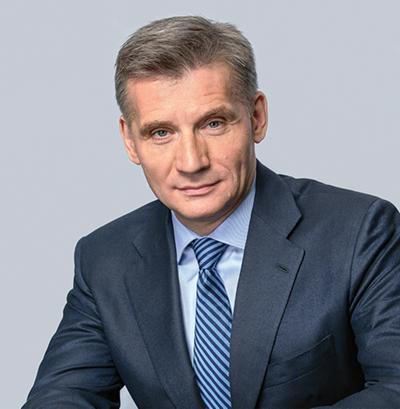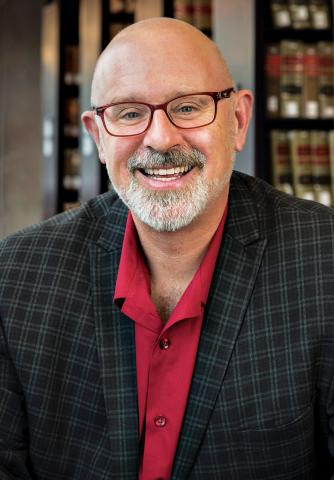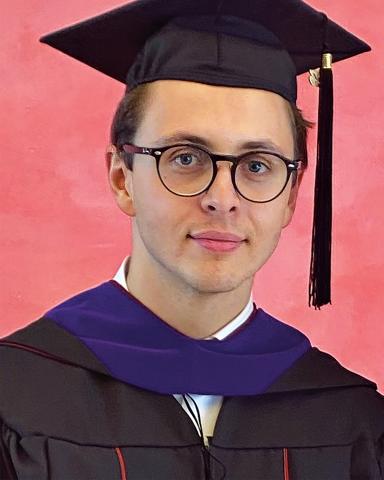With Two Generous Gifts, Pavel Malyi, LLM ’95, Promotes the Rule of Law Internationally

The early ’90s were an exciting time to be a young lawyer starting a career in Russia. Pavel Malyi, LLM ’95, received his law degree from Moscow State Institute of International Relations in 1991, when the forces for democratization in the Soviet Union had gained unstoppable momentum.
By year’s end, the Soviet Union ceased to exist. Its successor was the Russian Federation, and for Malyi and millions of his countrymen, the future seemed boundless. He took a job with one of the big American law firms that opened offices in Moscow and, Malyi recalled, “you had the feeling that Russia and other countries in the former Soviet Union were getting to a better place.”
As a lawyer—and, a few years later, as an investment banker—Malyi was a member of a young professional cadre who built a bridge between Russia and the rest of the world. “We helped countries and people and economies understand each other, allowing foreign investors to get exposure to Russia and allowing Russian businesses to expand internationally,” he said. “The optimism was exhilarating . . . And then something went terribly wrong.”
Malyi believes there are lessons to be learned from the Russian experience—its emergence from autocracy and its slow slide back into it. That is why he has given the University of Chicago Law School a generous multimillion-dollar contribution that is intended to inspire furthering the rule of law in countries or regions where it is under siege. The generous gift is funding the new Malyi Center for the Study of Legal and Institutional Integrity, which is focusing its work on stimulating new research on the role of institutions in society.
Why institutions? Because, Malyi contends, during the emergence from Soviet autocracy, Russians paid insufficient attention to the importance of institution-building or made mistakes in the effort.
The result, he said, has been “a broad range of institutional degradation.”
One particularly glaring institutional failure, according to Malyi, is the judiciary itself: “In courts, judges have been gradually turned into obedient servants of the Kremlin. Judicial independence is a joke in today’s Russia. Courts routinely prosecute the regime’s opponents disregarding the spirit, and sometimes the letter, of the law.”
A Two-Part Gift
Malyi’s gift to create the Center follows one he made in 2021 to establish the Malyi Scholarship Fund, which supports students in the Law School’s LLM program, with the aspiration that it may be an avenue for LLMs from Ukraine, Russia, and other post-Soviet states. The first four Malyi scholars arrived at the school last fall.
The second phase, the Malyi Center, launched early this year with Professor Tom Ginsburg—the Leo Spitz Distinguished Service Professor of International Law, and Ludwig and Hilde Wolf Research Scholar—as its faculty director. The Center’s goals and purpose are to expand academic research in international and comparative law by Law School faculty and encourage real-world impact through collaborative events such as conferences and speaker series.
Its focus on the study of institutions, Ginsburg explained, is an outgrowth of a paradigm that has emerged in social-science and legal scholarship over the last couple of decades.
“It’s become a central way of thinking about how development happens and how democracy is sustained,” he said. “Governance issues are all related to institutions, at least in our current paradigm, and the formation of the Center is driven by a sense that institutions everywhere are in trouble. They’re having trouble being legitimated. People are calling institutions into question. So, our idea is to try to double down on institutions to understand where they come from, how they’re sustained, how they’re resilient in the face of challenges, and how they die.”
On a personal level for Ginsburg, the Center’s focus falls within the bounds of his own scholarship, which concentrates on comparative and international law from an interdisciplinary perspective. He has written extensively about democracies and constitutions, but also about dictatorships and the conditions that give rise to them.
Ginsburg points out that the rule of law always requires institutions and that dictatorships are no different. That is, dictators find ways to influence insufficiently strong institutions to do their bidding.
“It’s never one person who runs a dictatorship,” he says. “It’s always a set of allies and elites who have agreed to the institutional structure. For example, in Putin’s Russia it’s obviously not just Putin. There are other institutions—the military, the courts—that have been a big part of his regime in recent years. It’s all the oligarchs who benefit from his regime. And they all kind of fit together in a way that makes them very resilient to shocks. And that’s how such systems are maintained.”
One of the purposes of the Center, Ginsburg said, is to understand the nature of institutions within democracies and dictatorships alike.
Malyi contends that deeper understanding of how some countries have enjoyed success at institution-building can be effective when applied in a different terrain. “Once in a while in many countries you do have opportunity to improve your economy or your political life to conduct reforms,” he says. “It helps if the people who actually implement these changes have had an opportunity to think about them beforehand and look at the best global practices—or maybe look at what other people did wrong.”
Governance issues are all related to institutions, at least in our current paradigm, and the formation of the Center is driven by a sense that institutions everywhere are in trouble.
Tom Ginsburg
Ginsburg said the Center intends to enlighten lawyers and policymakers about what those best practices are. There are plans to collaborate with organizations in other countries, particularly those in the former Soviet Union.
Helping Young Lawyers From Troubled Regions
Meanwhile, the Malyi Scholarship Fund will continue to train lawyers from those countries. For Malyi, the scholarship was influenced by his own experience as an LLM at the Law School in 1995. “I know it made a lot of difference in my life. So, looking back at the very sad state of affairs across the former Soviet Union and democracies in many countries being under threat, I thought a good way of paying back is to help young kids who just graduated and are thinking about how to build up their careers. They might have a year or two of practice under their belts, but it gives them a good opportunity to think anew about law, how it works, and how it affects people.”
Amrah Rahmanov, LLM ’23, is one of the four inaugural Malyi scholars; he was a specialist at the Financial Monitoring Service of the Republic of Azerbaijan before coming to Chicago. His primary responsibility there was drafting legal acts aimed at anti–money laundering and countering to the financing of terrorism. He’s not sure whether he’ll return to that job, but knows he will return to his home country.
Freedom House, a nonprofit organization known for political advocacy around issues of democracy, political freedom, and human rights, classifies Azerbaijan as an authoritarian country with a poor record on human rights and civil liberties. Rahmanov, however, won’t say that Azerbaijan is one of those countries where the rule of law needs strengthening and instead refers to it as a country still in transition from the old Communist system to one that is more mixed with some market-based reforms.
He is more emphatic when he talks about his year at the Law School, characterizing the experience as “magical.”
“It changed my mindset,” he said. “Here in the United States everything is different. It has settled capitalism and so on. But it’s like being born a second time in a different mindset and it changes everything. I was thinking about how I was drafting law before I came here, and now I think, ‘Oh, I could definitely, definitely write it another way.’”
Another Malyi scholar, Daniil Shamelo, LLM ’23, JD ’25, was practicing international law with an emphasis on cross-border dispute resolution as an associate in the Moscow office of Bryan Cave Leighton Paisner LLP, an international law firm. Bryan Cave closed its Moscow office in April 2022 in response to Russia’s invasion of Ukraine, its Russian base spinning off into an independent law firm, Alumni Partners. Shamelo continued practicing with Alumni, focusing much of his practice on sanctions-related advising, and gained valuable experience testing his leadership skills during a time of great uncertainty.
When the opportunity arose to study in the LLM program at the Law School, he jumped at it. “I was ready to challenge myself,” he said. “In Moscow, I did international law and international dispute resolution, but here I was interested in taking the foundational classes that the American legal system is famous for.”
In June, Shamelo was accepted into the Law School’s JD program, a new milestone for him, where he intends to pivot his studies toward a career in corporate law. No matter what direction Shamelo’s career takes, he will always cherish his year as a Malyi scholar. “The Law School’s people and the way they interact with each other—that is what I will remember.”
Although the scholarship program’s purpose is to train foreign lawyers in areas experiencing institutional challenges, Ginsburg pointed out that their presence in the law school is beneficial to all the students.
“I think it’s really good for Americans to be in a classroom where they are learning about institutions in another country firsthand from their fellow students,” he said. “In my own teaching I always try to draw out the LLM students to talk about their own legal systems because they really do vary profoundly from our own. And I think that’s good for everybody.”
Looking Ahead
Meanwhile, the Malyi Center is making plans and building networks. One of its goals for the year is to broaden and deepen connections between Chicago and academics and think tanks abroad.
“This has been kind of an experimental year because we’re just getting off the ground,” Ginsburg said. “I’m just really grateful to Mr. Malyi for seeing this opportunity and trusting us in this endeavor. I think it’s a critical time to do something like this because there’s kind of this sense of ‘Well, that didn’t work,’ and that the world is such a mess.”
Malyi, for one, would agree that the situation in his homeland is a mess. After practicing law for a few years, Malyi entered the world of investment banking and in 2016 he cofounded Matrix Capital, a financial boutique based in Moscow. Like many other businessmen, however, Malyi uprooted his operation after Russia invaded Ukraine in February 2022. Matrix is now located mostly in Cyprus.
Malyi said he knew the time had come to do something about trying to stanch the kinds of democratic erosion that occurred in Russia and felt he had the resources to do so. He’d maintained strong connections with the Law School for nearly 30 years and knew that that was the partner he wanted.
“I know the school is selective in the sponsors they pick up,” he said. “So, the ultimate feeling for me is that it’s an honor. I’m very thankful for the school and I hope I’m able to continue supporting them and doing the right thing.”
Richard Dahl is a freelance writer based in Saint Paul, Minnesota.

